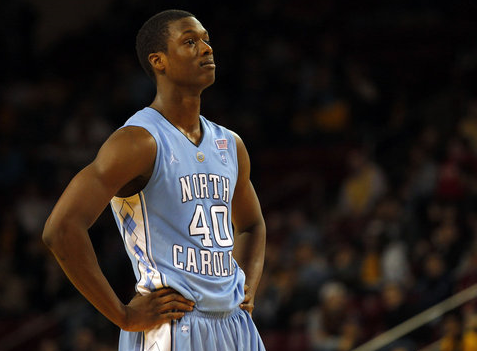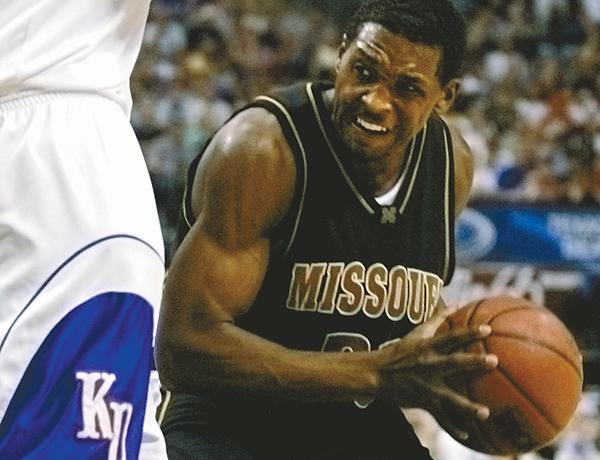On Defending the Indefensible: The Curious Case of Harrison Barnes and the Hype Machine
Posted by rtmsf on March 26th, 2012Now that Harrison Barnes‘ sophomore season has ended and the inevitable backlash against the young man for his 20-61 (32.8%) shooting performance in the NCAA Tournament has commenced, it’s time to take a step back to determine what we can learn from the endless hype and hyperbole surrounding a player who has suffered an enormous amount of pressure since the moment when he Skyped Roy Williams from his Ames High School gym to commit to North Carolina.
Barnes was projected as an AP preseason first team All-American before he’d even played a game of college basketball, and after a strong close to a somewhat enigmatic freshman season that earned him an honorable mention nod, he was placed on the AP preseason first team again this year. With today’s announcement of the 15 players selected as 2012 AP All-Americans and his name again nowhere on the list, we have to wonder how so many people continue to get it so wrong with this kid? It’s one thing to drop from the preseason first team to honorable mention once, but twice in consecutive years? Either he’s got a Pixar-like public relations department on retainer, or he’s simply not as good right now as everyone seemed to think.
Consider this argument made by CBSSports.com’s Gary Parrish back on Halloween, as two (of 65) AP voters had the temerity to leave Barnes off of their preseason ballots:
Vote for an All-American team, you had to do two things:
- Put Jared Sullinger on it.
- Put Harrison Barnes on it, too.
After that, do whatever you like. […] Anything within those guidelines is reasonable. But omitting Sullinger or Barnes is indefensible. […] Barnes only received 63 of a possible 65 votes, which means two people who supposedly cover college basketball for a living didn’t vote for the most talented player on the nation’s most talented team […] there’s no intelligent way to defend not including him on an All-American ballot.
Was Parrish’s stance a reasonable position at the time? Maybe; maybe not. In the last decade, only three other players were consensus AP All-Americans in the preseason: Jason Williams (2001-02), Tyler Hansbrough (2008-09), and Jared Sullinger (2011-12). In all three cases, the player was returning from a First Team All-America season which had resulted in individual national honors (Williams and Hansbrough had won at least one NPOY award, while Sullinger was the national FrOY). Maybe the two AP voters in question saw something that the rest of us missed after last season; or maybe they simply weren’t comfortable putting someone on the team whom they felt hadn’t yet shown he could consistently bring it.
But were they right? Absolutely. For the second consecutive season, Barnes didn’t even sniff the AP All-America team. Two of his teammates made it — Tyler Zeller and Kendall Marshall — along with Parrish’s other lock, Sullinger, but the so-called “most talented player” in college basketball wasn’t good enough to outperform two of his own Tar Heel teammates, much less his peers around the country.
And therein lies the lesson of sports, a lesson that media and fans alike seem to forget over and over and over again. Locks are not as lockish as we’d like to think they are. If they were, there would be no 2011 NBA Champion Dallas Mavericks, because a Miami Heat team with LeBron James and Dwyane Wade is too talented to lose a seven-game series to a less-talented team. There would be no Super Bowl XLII Champion New York Giants, because Tom Brady is a Hall of Fame quarterback leading the best team of all-time against a pedestrian group that went 10-6 in the regular season. There would be no Butler Final Four run in 2011, because, well, because mid-major lightning doesn’t strike twice.
Bringing it back closer to home, remember when Drew Neitzel, Rickey Paulding and Ronald Steele were preseason first team All-Americans? Yeah, nobody else does either. How about can’t-miss NBA prospects like Evan Turner (#2 overall in 2010), Hasheem Thabeet (#2 in 2009), Brandan Wright (#8 in 2007), Adam Morrison (#3 in 2006), or Marvin Williams (#2 in 2005)? They’re in the NBA litter box nowadays.
The list of ‘upset’ winners and can’t-miss players who very much did miss is so voluminous throughout sports history that the only real upset is those of us who keep falling prey to the whimsy and ambiguity of competition between elite athletes. Some guys get better every year; others do not. Harrison Barnes is still a really good basketball player — you might say that he’s only scratched the surface of his potential, and that five years down the road, he’ll have become the NBA All-Star everyone projected him to be. Or he won’t. The list of players who were considered the best of the best at the time is scattered with names everyone has now forgotten, yet they too were once hyped in much the same manner as Barnes.
We’re not at all suggesting that fans and analysts shouldn’t try to project forward. That’s not realistic nor is it any fun. But what we are saying — and this is the key point here, really — is that everyone needs to take a massive dose of humility along with their daily juice and corn flakes. This goes for the can’t-miss recruiting folks on to the college analysts through to all the draftniks who are absolutely convinced that so-and-so is the next Michael Jordan. Folks, everybody is guessing. It’s educated guessing, true, but the variables that go into these predictions are a lot more complex than anyone seems willing to admit. MJ himself wasn’t even MJ when he was drafted third overall in 1984. Five-time NBA champion Kobe Bryant was the #13 pick in 1996 and he was traded for a washed-up Vlade Divac on draft day. It wasn’t hard to see that 2003 top pick LeBron James was an athletic freak of nature, but now in his ninth year of professional basketball, how many championships rings has he won again?
It’s hard to predict the future, so all we ask is that folks recognize this essential fact when they’re making bold claims as if they owned a crystal ball. Not everyone can be Mike Francesa; they’re lucky if they’re even Jay Bilas.













































A year and half I recall pointing out on this very blog that it was foolish to include Barnes on preseason All-American teams…just saying…
(note: I was completely lucky)
The article was meant to throw the hype blanket on all of us, so we’re just as culpable as anybody else. I just don’t think that the media as a general rule is comfortable with the idea that they’re wrong as much as they’re right. I’d like to change that.
I never had faith in Harrison from the day he left Ames. At the beginning of last year, he looked like putty against Minnesota’s big men early in the season and he’s never really developed a post presence. He’s still never improved the way you expect players to over their college career.
As for Sullinger, I still think he is overrated, maybe I just got too used to seeing him garbage points and board in the last 5 minutes of his Big Ten games.
I don’t think either of them is best big man on their team (Zeller, and Thomas), and can’t imagine them being incredibly useful in the NUBA
I would bet money that the people who left Barnes off the list were local sports writers, who either cover Carolina or the ACC. A lot of people who follow that team closely would have picked one of his teammates over Barnes.
If Barnes had been injured instead of Henson and Marshall, UNC would most likely have won the ACC tourney and probably would still be playing in the NCAAs.